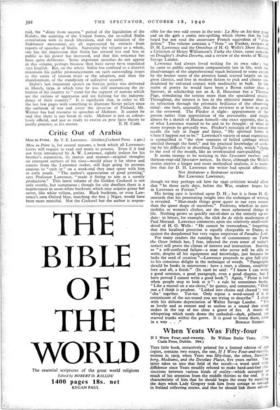Critic Out of Arabia
Men in Print. By T. E. Lawrence. (Golden ,Cockerel Press. 2 gns.) Men in Print is, for several reasons, a book which all Lawrence- lovers will require to read and many to possess. Even if it had not been introduced by A. W. Lawrence, rightly jealous for his brother's reputation, its matter and manner—original thoughts on emergent authors of his time—would place it far above and remote from the Lawrence racket, still kept going by persons anxious to " cash in " on a week-end they once spent with him in early youth. " The author's appreciation of good printing," says Professor Lawrence, " made it fitting to aim at a seemly production." This latest volume of the Golden Cockerel is not only seemly, but sumptuous ; though for city dwellers there is a hopelessness in snow-white buckram, which may acquire grime but never, like white vellum, patina. Black buckram, or even Law- rence's own Oxford blue, matching the fine Niger, would have been more merciful. Not the Cockerel but the author is respon- sible for the two odd errors in the text : La Rire on his first page and on the 49th a comic mis-spelling which shows that he had heard but not read the unsavoury French equivalent of " dan- delion." The volume contains a " Note " on Flecker, reviews of D. H. Lawrence and the Omnibus of H. G. Wells's Short Stories, a Criticism of Henry Williamson's Tarka the Otter, some remarks on Doughty's Arabia Deserta, and a review of the works of Walter Savage Landor.
Lawrence had always loved writing for its own sake • but he came to public expression comparatively late in life, with the disadvantages of the unprofessional touch balanced to some extent by the keener sense of the prentice hand, trained largely on the great classics, and free in modern fiction to pick and choose un- deadened by enforced contact with mediocrity in bulk. In the realm of poetry he would have been a Byron rather than a Spenser, in scholarship not an A. E. Housman but a Thomas Page, stimulating the serious more than the specialiSed reader. Throughout, the interest is less in the objective matter than in its refraction through the prismatic brilliance of the observing Mind : one feels, unusually, that the reviewer is at least as great as the reviewed. The Flecker is slight : appraisement of the person rather than appreciation of the personality, and might almost be a sketch of Hassan himself—the exact opposite, that is, of what Lawrence wanted to be and to be thought : of what in many respects he generally was. Flecker's nostalgia of the remote recalls the lady in Sugar and Spice, " My spiritual home is where I happen not to be." Lawrence's variety of nasal experience is exemplified in " the slow sourness of boiled cabbage which smelled through the hotel," and his practical knowledge of cook- ing by his difficulty in absorbing Twilight in Italy, which " dung to the roof of the mouth, like an overkneaded suet-pudding."
It seems strange to be noticing in this Spectator twelve- and thirteen-year-old Spectator notices. In these, although the Wells's stories receive a longer and more methodical analysis, it is mani- fest that .for D. H. Lawrence the writer had special affinities : Not litterateur a litterateur reviews
But Lawrence Lawrence; though we may perhaps ask how far 1940 criticism would allow that " In those early days, before the War, readers' hopes lay in Lawrence or Forster."
His loving care is lavished upon D. H. ; but it is from H. G. onwards that his penetrating insight into the technique of writing is revealed. "Man-made things grow queer to our eyes sooner than the queer shape of ourselves." Fashions, whether in auto- mobiles or women's clothes, are the most ephemeral things in life. Nothing grows so quickly out-of-date as the entirely up-to- date : in letters, for example, the slick fin de siècle modernism of Paul Morand. Lawrence comments upon the relatively small-scale detail of H. G. Wells : " He cannot be tremendous,' forgetting that this localised precision is equally chargeable to Dante, as against the deepdomed but very vague empyrean of Paradise Lost.
For many readers the running fire of commentary on Tarka the Otter (which has, I fear, infected the even tenor of today's notice) will prove the climax of interest and instruction. Starting as " a self-confessed failure—a man who never will be able to write, despite all his equipment and knowledge, just because he lacks the seed of creation "—Lawrence proceeds to give full play to his conscious delight in the technique of words. " Paragraphs should be books in microcosm : have a start, a climax, couplings fore and aft, a finish." (In 1926 he said : " I know I can write i good sentence, a good paragraph, even a good chapter, but I have proved I cannot write a good book.") Again, " Prose is bad when people stop to look at it ": a rule he sometimes broke. " Like a mussel on a sea-shore," he quotes, and comments, " Only one a I think is prudent. ' Linked into chains and chased ': two cha ' together. Tut-tut. Only repeat a word-sound if it is reminiscent of the act-sound you are trying to describe." I close with his delicate depreciation of Walter Savage Landor. " It's as lovely and as remote and as useless as a sound that wind makes in the top of too close a grove of firs. A music of whispering which steals down the cathedral—dark, pillared, yet starved trunks within the grove. It is good to listen there, once






























 Previous page
Previous page